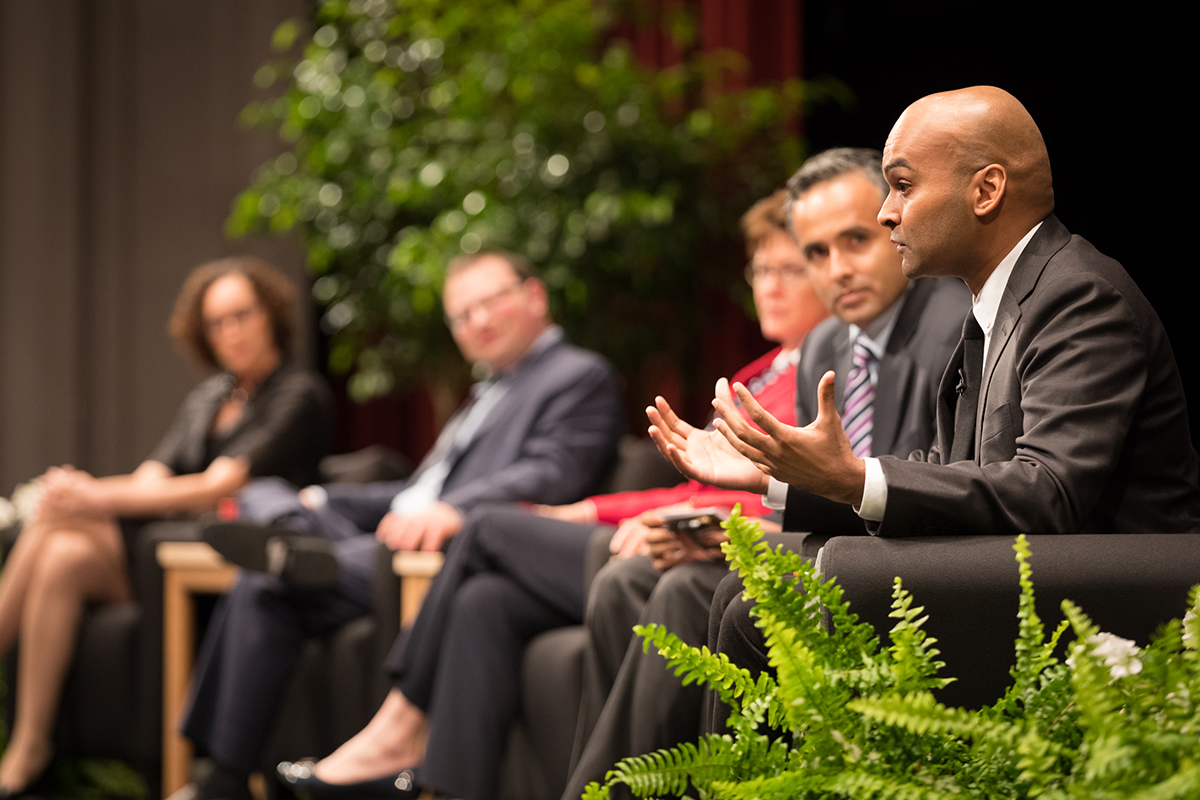Pre-debate panel examines justice system, immigration
By Rebecca Jackson

Panelists from across the political spectrum spoke passionately about immigration and incarceration reform Sept. 26 at Educate the Vote, a campus discussion immediately preceding the first U.S. presidential debate.
Students and faculty packed Bailey Hall for the discussion structured around questions from students and alumni in the audience and watching live on CornellCast and moderated by Gretchen Ritter ’83, the Harold Tanner Dean of the College of Arts and Sciences. Ranging across the ideological spectrum, panelists dissected the political and socio-economic factors underlying federal policy on immigration and incarceration and contrasted Hillary Clinton and Donald Trump’s positions on the issues.
“When you’re looking at affluent market democracies it happens that the deck is stacked against people with limited skills in terms of navigating the labor market,” said Reihan Salam, executive editor of the National Review. Salam described how employers who hire undocumented immigrants are at the root of the problem and rarely face punishment for their actions. As a result, immigrant workers bear the costs of our broken system, further perpetuating the cycle of inequality.
Karthick Ramakrishnan, associate dean of the University of California, Riverside School of Public Policy, argued that as a society, we undervalue low-skill work and lay too much blame for economic conditions at the feet of immigrants. He urged the audience to erase this social inequality by recognizing contriubtions by high- and low-skill immigrants to our economy.
Just as socio-economic inequality persists with immigration, racial inequality is particularly prominent in the criminal justice system, said Vesla Mae Weaver, associate professor of African-American studies and political science at Yale University. Speaking of Keith Scott, a black man shot and killed by police just days earlier in Charlotte, North Carolina. In the 1960s, she said, “… it was crime in the streets and urban revolts that necessitated policy action; today, it is the fiscal health of the states who can no longer afford it and the scars of generations. … Then as now cities burn from police violence.”
Such racial tensions play a significant role in the cradle-to-prison pipeline in poor, urban neighborhoods, she said, noting that many inner-city black children have their first negative encounter with law enforcement at a very young age. As a result, children are exposed to trauma and accumulate violations that ultimately lead them to prison.
“We face this issue in Texas, kids in school get misdemeanor citations for chewing gum, for throwing spitballs or for talking too loudly in class,” said Marc A. Levin, director of the Center for Effective Justice at the Texas Policy Foundation. Levin argued the first step in ending the cycle of incarceration is decriminalizing school infractions and creating alternative opportunities.
While much of the discussion painted a grim picture of U.S. politics, panelists expressed hope for a better future. Weaver closed by telling students they have the opportunity to make real changes: “I don’t have the answer. Where I am optimistic is in your generation, because your generation has begun to show signs of convergence in ideas about justice.”
The event was made possible by a gift from Jennifer Koen-Horowitz ’93 and Mark Horowitz. Sponsors included the American Studies Program, the Atkinson Center for a Sustainable Future, the Center for the Study of Inequality, the College of Arts & Sciences, the College of Human Ecology, the Cornell Institute for Public Affairs, the Cornell Population Center, the Department of Policy Analysis and Management, the ILR School, the Institute for the Social Sciences, the Judith Reppy Institute for Peace and Conflict Studies, the Office of the Vice Provost, the Program on Ethics and Public Life, the Roper Center for Public Opinion Research and Student and Campus Life.
Rebecca Jackson ’18 is a writer intern for the Cornell Chronicle.
Media Contact
Get Cornell news delivered right to your inbox.
Subscribe